By Amy Galliford
After nearly 17 years of service with churches of Christ, Sue Whiteley is concluding her time as a staff member in order to focus on family support in the next season. Between her roles in teaching, mentoring, facilitation and discernment, Sue has been a powerful conduit for the voice of God in our network, faithfully ushering us in His direction. Many of the key spiritual principles and practices that have come to define the network have their roots in her ministry. Sue recently spoke with Amy Galliford, reflecting on her life’s journey and her long walk with churches of Christ.
Waiting for Sue Whiteley’s face to appear on the Zoom call, I’m feeling nervous. Sue is a ‘discernmentarian’; her official role is to discern the movement in the spirit beneath the surface of any given conversation. Though I am the one interviewing her, part of me senses I am exposed, with Sue’s perceptive eye and spiritual discernment as incisive as they are razor-sharp.
Her candour soon puts me at ease.
“I knew if I didn’t take the opportunity, I would regret it until the end of my days. I was terrified; I had to walk straight into the eye of the terror,” Sue says, recalling the night before her first day at Australian College of Ministries where her involvement with churches of Christ began. Now a powerful prophetic voice in the network, those early ventures into leadership required her to muster up enormous courage in the face of her fragile self-confidence.
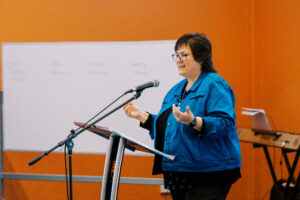
In confronting this sense of inadequacy, she was encouraged by God to look fear in the eye and move forward with His promise of unfailing companionship and guidance.
“My whole story is a story of bringing my desires to God in prayer, and Him directing and opening the doors. I’ve never had to push; every step has been Him opening doors, and some of them were challenging to walk through.”
With a background in spiritual mentoring and a Master’s degree in mystics, Sue began with ACOM in 2007, brought on to write curriculum for their spiritual formation units. In 2009, alongside expanding her formation teaching to the churches of Christ network, she pioneered a spiritual mentoring group. This early cohort was the first of 20 that she facilitated between 2009 and 2021. Since 2021, she has held the role of ‘discernmentarian’ on the churches of Christ Conference Executive board, giving attention to the spiritual enrichment of senior leaders.

Sue’s first spiritual mentoring cohort in 2009.
Despite all this, ‘leader’ is not a word she rushes to identify with. As Sue says, “I don’t see myself as a traditional leader; you know, the charismatic, up-the-front type. I see myself as a facilitative leader. I lead from the rim; I am one of the group.”
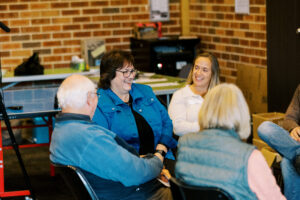
Perhaps a product of her personality, or perhaps a result of negative early messaging about women’s place in the church, self-confidence has been a recurrent wrestle in Sue’s leadership.
“I don’t see my lack of self-assuredness as a weakness, but partially as a strength. I never gallop ahead and think I’m smarter than I am.”
Sue finds that as she intently follows the direction of God, a deep assurance establishes her steps.
“If I know God has given me something to say, I can be really confident to give that word. I am at the frontier, not because I know where I’m going, but because God is saying, ‘Come on!’ and I say, ‘Okay, let’s go.’”
Sue’s leadership is inseparable from her followship. While the knowledge that others are following her could be intimidating, her focus is fixed elsewhere. She explains, “All I have to look after is my own formation, my own journey with God; anybody who happens to be following is following my followship of God. I am looking to God, not who’s following.”
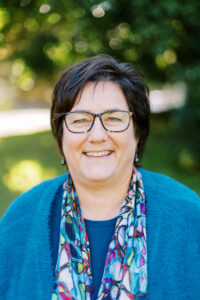
A verse that anchors her approach in this is found in Matthew 28, where Jesus instructs the disciples to “form them in the practices and postures that I have taught you.” As Sue sees it, her role is to form others as she is being formed in Christ, to lead as she is led.
Like a true student of the mystics, she references a prayer by St Therese of Lisieux, who she explains was put in charge of the spiritual formation of all the other nuns in her convent at the age of 20. Adapted from its original written form in A Story of the Soul, Sue’s own version of the prayer became, “Draw me and, in drawing me towards yourself, draw all others I love towards yourself, like a mighty river dragging everything along with it out into the ocean of yourself.”
God’s presence remains her confidence.
“I don’t have a whole lot to show unless He turns up.”
Navigating the zigs and zags of her own journey has depended on Sue’s ability to discern the presence of God. Describing how she recognises His direction, she says,
“There’s an energy that comes, unlike any other. It does have to be sifted – is my ego hungry for this or does it have that zing of God I have recognised before?”
For her, discernment is a kind of “inner knowing”, a sense she remains attuned to by “paying attention to Him all the time.” This ‘paying attention’ means she is listening constantly for God-given synchronicities and recurring themes in the everyday. Spiritual practices help with this. Like many, Sue journals. However, she also prioritises and teaches ‘harvesting’ journals, that is, regularly sifting through them to uncover the patterns and themes God has woven.
The ‘inner knowing’ works the other way too. When God is directing her away from something, Sue finds she is alerted by a deep feeling of “tightness, an inner check in my spirit, a tension that this is not pure, not right.”
These natural intuitions play a crucial role in her leadership as a spiritual mentor, group formation facilitator and discernmentarian.
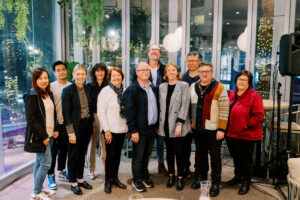
Sue pictured with the churches of Christ Conference Executive board, where she has served as the discernmentarian since 2021.
Her discernmentarian role has roots in the Quaker tradition; the discernmentarian is the person paying attention to the movement of God in the room. Much of this involves sifting through ideas by discerning whether they are founded in fear or love. She is looking for what is happening beneath the surface of what is being said, listening for the questions that are hovering in the room but not being articulated, and seeking the higher calling above different points of view.
Sue uses the language of St Ignatius to help her detect this.
“Ignatius talks about movement towards God and movement away from God; he calls these consolation and desolation. Consolation comes with a sense of peace, joy, energy, focus, clarity. Desolation comes with confusion, suspicion, fear, disintegration. I’m listening for evidence of these.”
The value a discernmentarian can offer depends on the receptiveness of the team. Sue emphasises, “People rarely talk about discernment as a role. Most discernment-wired people never get to be leaders because they are by nature observers.
“Every church has people gifted in discernment, but we have not recognised them, given them a seat at the table, valued their voice. The result has been going off track so many more times than we needed to.”
There are clear signs a team is on track, though: “There is fruit, and the fruit is transformation.”
Sue has seen plenty of fruit bloom in her 17 years with churches of Christ.
Through Sue’s teaching, mentoring and facilitation, key principles have worked their way into the DNA of churches of Christ. She has trained more than 250 individuals in leadership, discernment and mentoring, and introduced a treasury of spiritual classics to the network alongside key frameworks for self-knowledge such as Enneagram and Internal Family Systems. Core to her ministry was a focus on the life-long development of intimacy with God and the crucial role of spiritual practices in a thriving disciple. For her, practices such as journalling, harvesting and prayers of examen function as ‘dew collectors’ – ways of reaping the gifts of heaven in the everyday.
Her pioneering of spiritual mentoring groups in the movement has seen 20 cohorts of individuals undergo deep formation and return to their communities equipped to form others in turn. Sue’s concept of ‘The Brew’ found its origin in these groups.
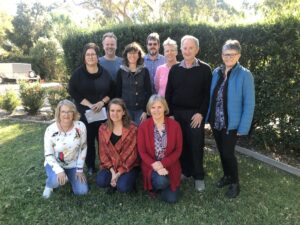
One of the 20 spiritual mentoring cohorts Sue has facilitated in the past 17 years.

Another of Sue’s spiritual mentoring cohorts.
After observing a pattern in the group formation, Sue uncovered ten key elements, or ‘spiritual enzymes’, that were catalysing these unique bonds of unity in the cohorts. Among these enzymes were life story telling, spiritual formation story updating, the cultivation of relational micro-skills, the equalisation of voices in the group and the art of intentional affirmation. These elements were ‘The Brew’ that created the group conditions for ‘Hesed’ – an Old Testament Hebrew word that describes the ‘loving-kindness’ between people and God. The result of this Hesed love within these groups was always spiritual transformation.
As Sue sees it, these kinds of communities are non-negotiables in the Christian walk. “You can’t even love, or be kind, or be patient, unless you have others,” she says. She goes on to describe the need for such covenantal relationships in ongoing formation.
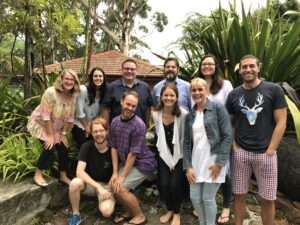
Another of Sue’s spiritual mentoring cohorts.
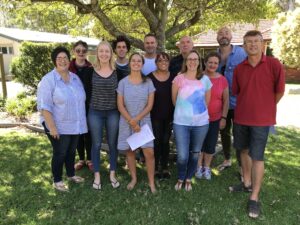
Another of Sue’s spiritual mentoring cohorts.
“I think leaders today need to spend more time with God, seeking to understand their unique vocations. Like Olympic swimming athletes, we need to stop looking across at how we are doing alongside the performance of others. We need to discover through prayerful self-observation what makes each leader unique, and we need community to help us do that. Covenant communities give you enormous confidence and belonging – that is the soil that good leaders need.
“It’s beautiful to see the sparkle of God-energy in a leader and point it out and affirm it; breathe life on that little sparkle so that person can believe more of what is inside them already. We need that affirmation like we need oxygen.”
In reflecting on her journey, and the countless journeys she has watched unfurl in her ministry, Sue reflects with characteristically poetic words,
“There’s a God-given seed put in my soul and everyone’s soul that has all the capacity to become something beautiful. Like a daffodil shoot trying to push through the earth, that calling is trying to erupt in our lives. That’s our whole reason for living.”
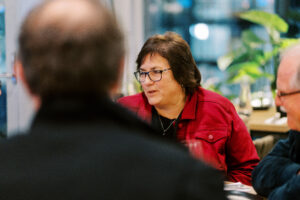
As Sue’s calling has intersected with churches of Christ, both parties say farewell deeply changed for the better.
“I’m leaving with a profound sense of gratitude that God has given me this family and community for me to live in for nearly 17 years; 17 years of people I have loved deeply. I’m leaving with a full, warm heart. It’s been the highlight of my life thus far, this work.”
Read more stories from churches of Christ in NSW & ACT HERE